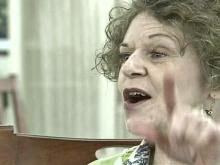
Raleigh — Most people know what it's like to try to grasp for the right word but draw a blank.
For people with brain injury from stroke or other causes, it can happen all the time with almost every word. It's a communication disorder called Aphasia.
Special group therapy may help people with Aphasia to relearn ways to communicate, either through words, writing or gestures.
Among the members of a therapy group at WakeMed is a former N.C. State public speaking professor, a former truck driver and a beloved mother, Elizabeth Cox.
She described her story in halting speech, "I had a stroke, and thanks be to God, I survived."
Cox's stroke lead to Aphasia.
"If you have Aphasia, it's like having a file cabinet that has all of your information and your knowledge stored and it gets tipped upside down," said Maura Silverman, an Aphasia therapy specialist.
With Aphasia, the words are scrambled, but the intellect is intact, according to Silverman. That's what Cox's daughter, Julie Stickler, said she knew all along.
